














 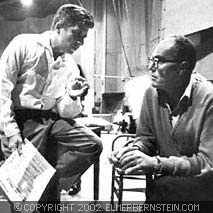 |
|

The Western Scores
The movies we call "Westerns" are intrinsically an American art form. Westerns are the American equivalent to films about Medieval Europe (and the myth of King Arthur) or the wildly adventurous tales of French, Spanish, English, and American piracy on the high seas. Westerns are borne out of the often fictionalized history of western expansion of the United States during the 1800s, when a stalwart legal system was in short supply and lawlessness was as common as Yankee resourcefulness. With western expansion came cattle towns, mining towns, and rural farming communities, where gambling, gun fighting, cattle rustling, and bank robbery were pervasive. These are all potent resources from which first historians and novelists, then film makers and composers would draw upon to entertain us in the safety of our living rooms or a darkened theater.
In the earliest western movies, just as early cowboys wore giant hats, shiny double-pistol rigs, and wore their pant legs tucked into their boots, early western film music was grandiose and colorful, but more in a classical European style. Watching western films between 1935 and 1945, I sometimes think you could have easily switched swashbuckling sea adventure scores with American western scores, and no one would have been the wiser. But by the Forties and early Fifties, composers like Dimitri Tiompkin, apparently in cahoots with the studio marketing departments, started integrating western vocal songs into their scores, sung over the opening and end credits, and sometimes during the film. Victor Young and Max Steiner had done this previously for director John Ford, but it was Tiompkin's "Do Not Forsake Me, Oh My Darling" from 1952's High Noon that started a wave of folksy, melodramatic vocal songs. But changes were coming from Jerome Moross and Elmer Bernstein that would turn this trend on its head.
If Aaron Copland had created a new musical language for America through ballets and concert works like Billy the Kid and Appalachian Spring, Jerome Moross transmuted this language for the big screen most impressively in The Big Country (1958). In the film's main title sequence, Moross' rapid 16th-note string ostinato announces an entertainment of grand size, reflected in the wide screen vista of the prairie and a lone stagecoach advancing on a western town. Huge orchestral chords are followed by what has come to be called Big Sky Music, where wide open spaces are exemplified by open melodies (simple, 5-note pentatonic scales) and broad chordal voicing.
No doubt influenced by this antecedent, Elmer Bernstein was in 1958 warming up in the bull pen, so to speak, to compose what would become the definitive Western score for the next 20 years.
The Magnificent Seven (1960).
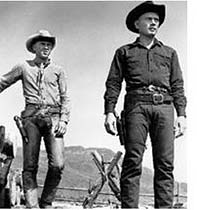 Number 8 on American Film Institute's Top 10 Movie Scores of all time, although I would have placed it even higher. This is The Perfect Score. By that I mean, from the main title to the last frame of film, there is not a wasted or unnecessary note, not a single misstep in how best to approach a scene; more than this, it sounds like nothing movie audiences had ever heard before in the context of a film; overtly masculine, the score also contains moments of great tenderness and folk music that honors the lives of the Mexican farmers. Its energy and kineticism are as heroic as the larger-than-life characters that fill the screen (Director John Sturges often shoots his actors from a low angle to emphasize their strength). And for Elmer Bernstein fans, we only had to hear the opening notes of the score to know that no other composer of the time could have written it. This is part of the joy of being an EB enthusiast. Number 8 on American Film Institute's Top 10 Movie Scores of all time, although I would have placed it even higher. This is The Perfect Score. By that I mean, from the main title to the last frame of film, there is not a wasted or unnecessary note, not a single misstep in how best to approach a scene; more than this, it sounds like nothing movie audiences had ever heard before in the context of a film; overtly masculine, the score also contains moments of great tenderness and folk music that honors the lives of the Mexican farmers. Its energy and kineticism are as heroic as the larger-than-life characters that fill the screen (Director John Sturges often shoots his actors from a low angle to emphasize their strength). And for Elmer Bernstein fans, we only had to hear the opening notes of the score to know that no other composer of the time could have written it. This is part of the joy of being an EB enthusiast.
There are so many great music cues in this film--enough to fill a textbook--so I have selected five that I hope adequately express the depth of this achievement in film scoring.
Main Titles. Contrary to the galloping riff that has become part of popular movie culture--the I IV-IV-V, I-I IV-IV-V--the score actually kicks off with huge, syncopated Eb chords that immediately signify the Modern Western and a promise of intense physical action. The string section launches the rapid, repeating eight-notes that propel Elmer's brief prologue, an energetic leitmotif for the spirit of the vanishing cowboy--the stock from which Chris (Yul Brynner) will draw to help the Mexican farmers rid their village of violent bandits.

This leads into the music that has become part of the movie-goers' consciousness and film history: the theme for The Magnificent Seven, that charging tune that conjures up images of rugged cowboys on horseback, galloping across the horizon to an uncertain destiny, and in some cases, a kind of redemption from a lawless past. A chiming celesta rings out the notes of the celebratory string melody, accentuating the heroism of the seven hired gunmen.

Elmer reprises the theme once more, with a slightly different arrangement, then modulates to F major where we are treated to the composer's majestic counterpoint melody written for brass. This segues into the softer, strummed guitar variation of the theme, where the woodwinds carry the melody. Interestingly, it is this theme that literally parallels the tempo of much of the film; it's slow and lyrical--more of a horse trot than a full gallop.
Bernstein ends the main title sequence with a rousing reprise of the Seven theme. As he did in the Exodus sequence from The Ten Commandments, Bernstein often ramps up the tempo of the music, which is counter to some of the slower moments in the film, to build excitement and anticipation for the gun battles, which are shot and edited to achieve a more rapid rhythm. In the Metro Goldwyn Mayer's Special Edition release of The Magnificent Seven, actor Eli Wallach, who delivers a great performance as the bandit leader, Calvera, remarked that if he'd have heard Elmer's music while they were filming the movie, he'd have ridden his horse better!
Calvera. Just as John Williams gave us his great villain music for Darth Vader for the Seventies Space Opera, Bernstein composed the quintessential "bad guy" music for the Sixties Western. As the opening credits fade out with the theme music, we can see beyond the corn fields of the village, a line of riders approaching. Wood blocks, tympani, and low strings hammer out a pulsating rhythm as we hear EB's 8-note leitmotif for Calvera and his men.

The music so perfectly portrays the villains as ominous, dangerous, and greedy men who hatefully emasculate the men of the village by helping themselves to anything they want. Elmer ingeniously uses intervals and melodic lines vaguely reminiscent of flamenco music--only arced up in a menacing way. After Wallach mocks the farmers by cynically acting as their friend and protector, a farmer charges at Calvera, yelling "murderers!," and is cut down by a bullet. Bernstein answers this act of violence with music that is as deeply human as the plaintive cry of the wife who runs to her slain husband. The emotion it conveys is heartfelt and honest.
Readying for Battle. Elmer composes a suite of sorts for one of the best sequences in the film--where the Seven ready the farmers for battle. As the cowboys sit down to dinner, a young village woman, Petra (Rosenda Monteros), serves each of them, favoring Chico (Horst Buchholz) and ignoring a comically hungry Vin (Steve McQueen). We hear Bernstein's beautiful Mexican folk melody played on a single flamenco guitar. With its wonderfully earthy quality, the leitmotif sounds "of" the village, not about the village. In this scene, Bernardo (Charles Bronson) reminds his compadres that the farmers are living on next to nothing while the Seven are being treated like royalty.

Sturges then moves seamlessly to the next scene, where McQueen and Harry (Brad Dexter) serve food to the children of the village. The guitar theme continues until the slow dissolve to the following day, where McQueen and Britt (James Coburn) are teaching the farmers how to fire the weapons they've taken from Calvera's downed men. Elmer brings in a lovely, flowing Mexican theme in 3/4 that is as rootsy and poetic as a Diego Rivera mural. As a piccolo and flute weave an ascending melody, McQueen becomes distracted by the village women nearby, who move rhythmically as they scrub clothes against river rocks. The music emphasizes the innocence of the farmers and how the Seven are gradually won over by the people they've come to protect.
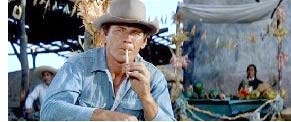 The final scenes in this sequence begin with Bronson becoming exasperated with one farmer with a rifle who keeps missing his target because he "gets excited." Bronson says, "Miguel, didn't I tell you to squeeze? Just like when you're milking a goat." This dissolves to Bronson and McQueen stretching a giant net across one of the trails into the village. Mariachi trumpets sound the exhilaration of the farmers who are ready to defend their village and drive off Calvera. There is nothing mock or faux about this music. Bernstein's themes are so integrated and appropriate that, again, they seem to be born of the village. The final scenes in this sequence begin with Bronson becoming exasperated with one farmer with a rifle who keeps missing his target because he "gets excited." Bronson says, "Miguel, didn't I tell you to squeeze? Just like when you're milking a goat." This dissolves to Bronson and McQueen stretching a giant net across one of the trails into the village. Mariachi trumpets sound the exhilaration of the farmers who are ready to defend their village and drive off Calvera. There is nothing mock or faux about this music. Bernstein's themes are so integrated and appropriate that, again, they seem to be born of the village.
The Gun Battles. With Sturges at the helm, the action sequences are all expertly choreographed and filled with almost balletic movement. Buchholz bounds over fences, runs in and out of adobe buildings, blazing away with his revolver. McQueen, always the athletic actor, pivots and fires his weapon, leaps over barricades, and even rides his horse at a full gallop while getting off rounds from his Winchester rifle. Bronson leaps across roof tops before getting wounded trying to keep some village children out of harm's way. Elmer's underscore, loud and percussive, employs variations on Calvera's villain music as well as the heart pounding "cowboy spirit" music we first heard in the prologue of the main titles. His music heightens the action to a level where you almost begin to hyperventilate.
Only the Farmers Have Won. The final scene in The Magnificent Seven begins after the dust has settled on the final battle and Brynner surveys the aftermath. It begins with a beautifully composed wide shot of the farmers in their fields looking in toward the square, where Brynner, McQueen, and Buchholz say their goodbyes to the old man and elder of the village (Vladimir Sokoloff). The Bb major broken triad over an Ab major chord articulates peace and a new beginning for the farmers. "You helped rid them of Calvera, the way a strong wind rids them of locusts" Sokoloff tells them. Moments later, as the three remaining cowboys ride up to the crest of the hill overlooking the village, we hear the quieter, more legatto version of the Seven theme, with that wonderful major IV to minor IV to I progression. With Chris and Vin's silent affirmation, Chico, once a farmer himself, rides back to Petra, and Brynner and McQueen ride off to Elmer's boisterous ending fanfare.
The Magnificent Seven score is extraordinary and sets the bar high for subsequent Westerns of the period (see Postscript below). And, by the way, the film is also a modern classic. Based quite closely on Kurosawa's Seven Samurai, the film covers themes that will be explored in movies throughout the Sixties and Seventies. The Professionals (1966) and even war films like The Guns of Navarone (1961), The Dirty Dozen (1967), and The Devil's Brigade (1968) will tell similar stories of men bound together by a common cause, who find redemption in acts of heroism. On a lighter note, anyone familiar with Pixar's delightful animated film, A Bug's Life (1998), will instantly recognize the story as a retelling of The Magnificent Seven, only with an ant colony and a rag-tag bunch of circus performer insects.
The Sons of Katie Elder (1965).
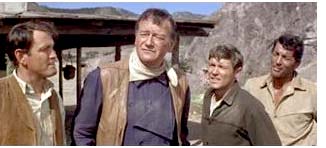 By 1965, John Wayne had adopted Bernstein as his preferred composer and this was their second collaboration. The Sons of Katie Elder is Wayne's best post John Ford and Howard Hawks western (yes, better than True Grit), sporting a great cast (Dean Martin, Earl Holliman, and George Kennedy are excellent), solid script and direction, and music that perfectly fits this tale of four reunited brothers coming to pay their respects to a mother they all but abandoned. We first hear Elmer's great theme music as we watch a steam train chugging through rugged mountains supposedly carrying John Elder (Wayne) to Katie's funeral in Clearwater, Texas. The tune pays tribute to Katie, whom we never actually see in the film, but whose presence is felt throughout (partly through her Bible and favorite rocking chair). The music is at once heroic (the brothers will stop a corrupt gunsmith and avenge their father's murder), and spirited (signifying four wild sons tamed by Katie's love and hope for them). By 1965, John Wayne had adopted Bernstein as his preferred composer and this was their second collaboration. The Sons of Katie Elder is Wayne's best post John Ford and Howard Hawks western (yes, better than True Grit), sporting a great cast (Dean Martin, Earl Holliman, and George Kennedy are excellent), solid script and direction, and music that perfectly fits this tale of four reunited brothers coming to pay their respects to a mother they all but abandoned. We first hear Elmer's great theme music as we watch a steam train chugging through rugged mountains supposedly carrying John Elder (Wayne) to Katie's funeral in Clearwater, Texas. The tune pays tribute to Katie, whom we never actually see in the film, but whose presence is felt throughout (partly through her Bible and favorite rocking chair). The music is at once heroic (the brothers will stop a corrupt gunsmith and avenge their father's murder), and spirited (signifying four wild sons tamed by Katie's love and hope for them).

The film has many memorable music moments, but there are two leitmotifs that bear examination. The first is when the Elder brothers get reacquainted with their fists in a very well staged and humorous fight. Elmer cleverly scores the scene like a Wild West "dance" or jig, played primarily by strings and brass, with the assistance of snappy percussion and a kettle drum, whose pedal is used to quickly change pitch for comedic effect. The second is the theme for Katie, which is used whenever her influence is felt by the characters. Bernstein gives us a quiet, reflective melody reminiscent of a Stephen Foster American folk song played by oboe or accordion.

These and other cues eloquently demonstrate Elmer's deep understanding of the film medium and how music can enhance our enjoyment of character, setting, and story.
The Hallelujah Trail (1965).
One of my top five favorite Bernstein scores and the equivalent of Elmer's Third Symphony. I remember seeing this movie--shown in 70 mm Cinerama format--in a grand old theater downtown. Shot in Ultra Panavision, The Hallelujah Trail is a spoof of the American Western, and should have been a good entertainment; it had John Sturges in the director's seat, a roster of good actors (Burt Lancaster, Lee Remick, and Donald Pleasence), spectacular cinematography featuring breathtaking New Mexico landscapes, and of course Elmer's wonderfully majestic music. The problem is that the film simply isn't very funny, and its depiction of the American Indian is painfully stereotyped.
But the music for this film is as rich a musical canvass as Elmer Bernstein ever painted. The story is about the convergence of three parties interested in intercepting a whiskey shipment wagon train: a Cavalry-escorted temperance group, a Denver citizens militia needing booze for the winter, and a band of Sioux Indians. So the premise provides Elmer with a splendid opportunity to create themes for each of the traveling parties, as well as a theme for the West itself.
Elmer's Overture--remember those?--is chock full of instantly memorable tunes. After the opening fanfare, it launches into the Denver Free Militia theme, a jaunty, banjo-pickin', piccolo piping march that will put a smile on your face.

The Cavalry theme follows and is appropriately regal and grand, which segues into the Great Plains music--as beautiful and majestic a piece of music as Elmer ever composed (in 5/4 time signature to boot).

The overture concludes with the Temperance Marchers' call to action, "Stand Up, We'll March to Denver" ending with a suspended-to-resolved chord finale. In these 3:26, Bernstein shows his remarkable range, intuitive understanding of dramatic hyperbole to heighten comedy, and a simply amazing gift for melody.
Still, the musical centerpiece for The Hallelujah Trail has to be the main title sequence featuring a 40-voice chorale, singing a rousing gospel call and response, not unlike Bernstein's God's Little Acre theme. Frequent collaborator, Ernie Sheldon, marries his humorous lyrics to Elmer's infectious melody, which I'll venture to say, you'll want to listen to over and over again on the CD release.

It's a shame that the film did not measure up to the musical score. Time and again EB shows his uncanny ability to create humor where there is little on the screen, such as when Brian Keith's wagons full of whiskey slowly sink into quicksand or when Lancaster is caught off guard by Remick's tipsy overtures (aided by Elmer's syrupy sweet violin figure), or when Oracle (Pleasence) sees his visions with each swig of whiskey. Though the film went the way of other behemoth and rather flat comedies of the time (The Great Race and It's a Mad, Mad, Mad, Mad World), it did contain a score that, like those scores (by Mancini and Ernest Gold), was quite wonderful. I highly recommend the CD soundtrack.
Other Notable EB Western Scores
After helping to re-invent the modern Western film score, Bernstein went on to compose music for many more films in the genre, particularly through the 60s and early 70s--and there are many exceptional works. I couldn't begin to address them all here, but I do recommend these three films and film scores:
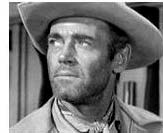 The Tin Star (1957). Directed by Anthony Mann and starring Henry Fonda and Anthony Perkins, this film is notable for its debunking of the heroic sheriff and getting at the reality of what it means to kill or be killed. Elmer's main theme is as steady and graceful as bounty hunter Fonda teaching a young Perkins how to draw and fire a gun. The Tin Star (1957). Directed by Anthony Mann and starring Henry Fonda and Anthony Perkins, this film is notable for its debunking of the heroic sheriff and getting at the reality of what it means to kill or be killed. Elmer's main theme is as steady and graceful as bounty hunter Fonda teaching a young Perkins how to draw and fire a gun.- The Scalphunters (1968). Bernstein brings everything to the table for this social satire with a moral lesson about the evils of slavery and greed: good action cues, great theme song, fun comedic music.
- True Grit (1969). EB and lyricist Don Black do an admirable job of composing a Jimmy Webb-sounding pop song for Glenn Campbell to sing over the opening credits (the single hit #9 on the American country charts). The real joy, however, is watching Wayne have such a good time in his role as Rooster Cogburn, hearing Elmer's music support the intense action sequences ("Fill your hands you son-of-a-bitch!"), and enjoying the beautiful Colorado Rockies cast in autumn sunlight.
Postscript
Elmer Bernstein brought to the Western the vibrant, wide open melodies we could sing on the way home from the theater, propelled by thundering, syncopated percussion that has influenced the work of many other film composers:
- Alfred Newman's How the West Was Won (1962) and Nevada Smith (1966). Demonstrates how even a great composer like Newman could be influenced by a younger colleague.
- George Duning's Big Valley TV theme. A nice reciprocity, given that Duning had coached Elmer about the mechanics involved in film scoring when the young composer was at Columbia pictures.
- David Rose's High Chaparral TV theme. One of the most memorable TV western theme songs from the 1960s/70s.
- Ken Thorne's Hannie Caulder (1971). A vastly under-appreciated score that, linked to a better film, would have been a more recognized achievement. The main theme and some of the individual cues written for Hannie's travels to Mexico to a gunsmith celebrate EB's influence but are excellent in their own right.
- Bruce Broughton's Silverado (1985). Broughton has been in the top tier of superior film composers for the past 3 decades, and his score to this Lawrence Kasdan Western pays tribute to Bernstein's musical palette.
- Marc Shaiman's City Slickers (1991). One of the best comedy scores of the 1990s, Shaiman parodies everything from fire-side harmonica tunes, rodeo roping music, and the slow galloping, big sky themes reminiscent of Elmer's spirited melodies.
|
|

